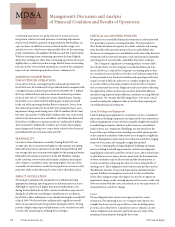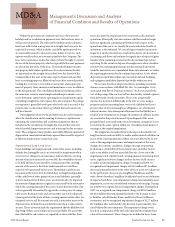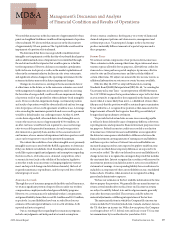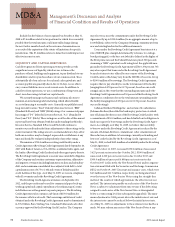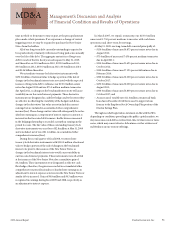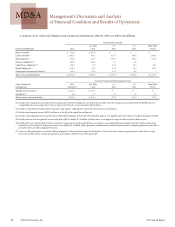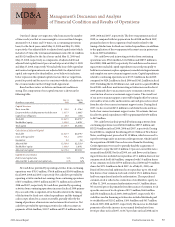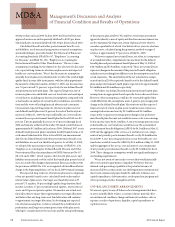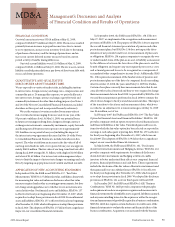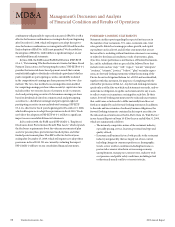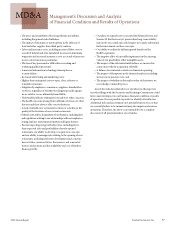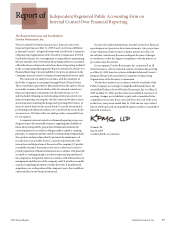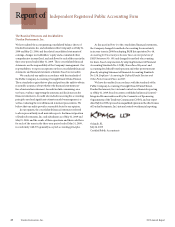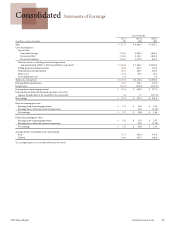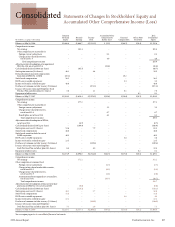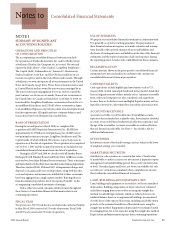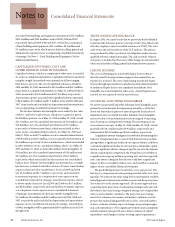Red Lobster 2009 Annual Report Download - page 38
Download and view the complete annual report
Please find page 38 of the 2009 Red Lobster annual report below. You can navigate through the pages in the report by either clicking on the pages listed below, or by using the keyword search tool below to find specific information within the annual report.
36 Darden Restaurants, Inc. 2009 Annual Report
MD&A Management’s Discussion and Analysis
of Financial Condition and Results of Operations
combination will generally be expensed as incurred. SFAS No. 141R is
effective for business combinations occurring in fiscal years beginning
after December 15, 2008, which will require us to adopt these provi-
sions for business combinations occurring in fiscal 2010 and thereafter.
Early adoption of SFAS No. 141R is not permitted. We do not believe
the adoption of SFAS No. 141R will have a significant impact on our
consolidated financial statements.
In June 2008, the FASB issued FASB Staff Position (FSP) EITF
03-6-1, “Determining Whether Instruments Granted in Share-Based
Payment Transactions Are Participating Securities.” FSP EITF 03-6-1
provides that unvested share-based payment awards that contain
nonforfeitable rights to dividends or dividend equivalents (whether
paid or unpaid) are participating securities and shall be included
in the computation of earnings per share pursuant to the two-class
method. The two-class method is an earnings allocation method
for computing earnings per share when an entity’s capital structure
includes either two or more classes of common stock or common
stock and participating securities. It determines earnings per share
based on dividends declared on common stock and participating
securities (i.e., distributed earnings) and participation rights of
participating securities in any undistributed earnings. FSP EITF
03-6-1 is effective for fiscal years beginning after December 15, 2008,
which will require us to adopt these provisions in fiscal 2010. We do
not believe the adoption of FSP EITF 03-6-1 will have a significant
impact on our consolidated financial statements.
In December 2008, the FASB issued FSP 132(R)-1, “Employers’
Disclosures about Postretirement Benefit Plan Assets,” which expands
the disclosure requirements about fair value measurements of plan
assets for pension plans, postretirement medical plans, and other
funded postretirement plans. This FSP is effective for fiscal years
ending after December 15, 2009, which will require us to adopt these
provisions in fiscal 2010. We are currently evaluating the impact
FSP 132(R)-1 will have on our consolidated financial statements.
FORWARDLOOKING STATEMENTS
Statements in this report regarding the expected net increase in
the number of our restaurants, U.S. same-restaurant sales, total
sales growth, diluted net earnings per share growth, and capital
expenditures in fiscal 2010, and all other statements that are not
historical facts, including without limitation statements concerning
or related to the financial condition, results of operations, plans,
objectives, future performance and business of Darden Restaurants,
Inc. and its subsidiaries that are preceded by, followed by or that
include words such as “may,” “will,” “expect,” “intend,” “anticipate,”
“continue,” “estimate,” “project,” “believe,” “plan” or similar expres-
sions, are forward-looking statements within the meaning of the
Private Securities Litigation Reform Act of 1995 and are identified,
together with this statement, for purposes of complying with the
safe harbor provisions of that Act. Any forward-looking statements
speak only as of the date on which such statements are made, and we
undertake no obligation to update such statements for any reason
to reflect events or circumstances arising after such date. By their
nature, forward-looking statements involve risks and uncertainties
that could cause actual results to differ materially from those set
forth in or implied by such forward-looking statements. In addition
to the risks and uncertainties of ordinary business obligations, the
forward-looking statements contained in this report are subject to
the risks and uncertainties described in Part I, Item 1A “Risk Factors”
in our Annual Report on Form 10-K for the year ended May 31, 2009,
which are summarized as follows:
• The intensely competitive nature of the restaurant industry,
especially pricing, service, location, personnel and type and
quality of food;
• Economic and business factors, both specific to the restaurant
industry and generally, that are largely out of our control,
including changes in consumer preferences, demographic
trends, severe weather conditions including hurricanes, a
protracted economic slowdown or worsening economy,
unemployment, energy prices, interest rates, industry-wide
cost pressures and public safety conditions, including actual
or threatened armed conflicts or terrorist attacks;


